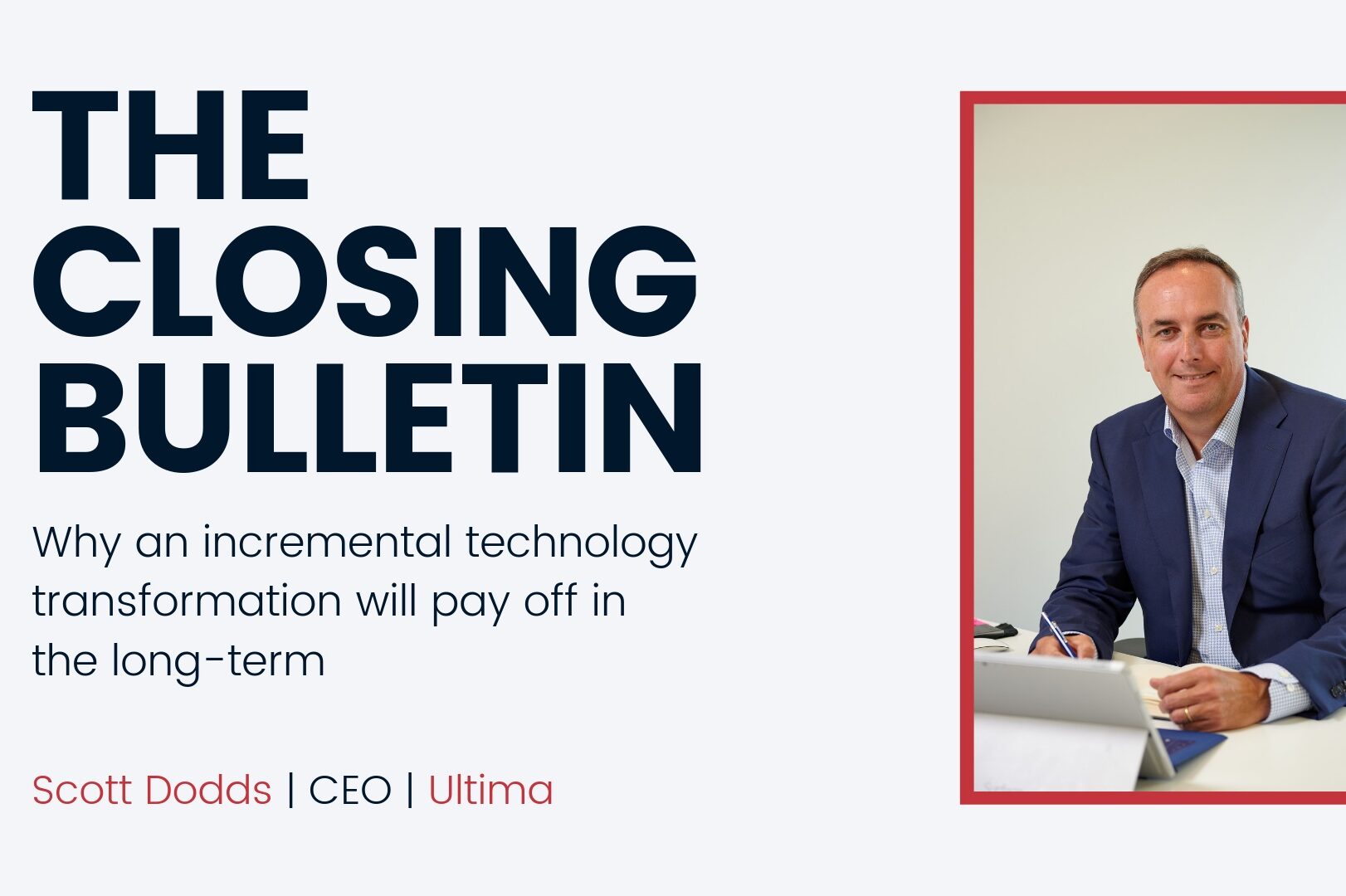
Digital transformation is a hot topic – and no longer the preserve of big multinational enterprises. Businesses everywhere stand to make significant gains by moving from legacy technology systems to automated alternatives, both in terms of productivity and competitive advantage.
The cloud means all businesses can scale as and when they like and the Internet of Things will bring hyper-connectivity that will accelerate the speed of change further. However, for many companies, the prospect of embarking on the digital transformation journey can be daunting. What technologies should they be embracing? Where do they start?
The best approach is to take incremental steps in building your ‘Intelligent Automation’.
RPA (robotic process automation) is a good place to start. The process of using software robots to automate mundane, repetitive tasks, RPA is being increasingly embraced by UK businesses on the back of recent industry successes.
Ultima has been using RPA technology to automate our own back-end operations and we’ve seen productivity rise by a factor of two since implementing the technology across five processes. We’re using RPA to aggregate sales pipeline data from 32 individual spreadsheets and systems and presenting the data in PowerBI. This has saved 8 hours of people-hours per day, saving one full-time admin head at £20k per year. Not only that, but the information can be run at 100% accuracy multiple times per day.
By taking care of mundane tasks, RPA frees companies to explore more complex AI-based automation. But before enterprises can consider advanced automation, they need to look practically at their infrastructure, workforce and security, and consider what might need to change to enable their businesses to be set on a positive path to digital transformation.
Ideally, your employees will have secure access and data sharing regardless of where they are located to maximise performance and productivity. Technology from companies such as Microsoft, VMWare and Citrix allows secure and easy access to your business applications and data irrespective of location and device. Working with a managed services partner to ensure you have the right combination of technology to allow you to create a successful modern workspace will allow you to operate on a ‘pay-as-you-go’ model. Here you pay, per user, per month and can scale up as appropriate and take advantage of software upgrades without spending vast amounts of capital.
Part of your digital transformation is likely to involve moving your data from on-premise servers to the cloud. By engaging with a cloud services provider you remove the burden on IT and improve business agility by allowing you to provision apps and desktops faster. And, you will benefit from the latest security features and management functionality of a modern operating system that won’t go out of support.
The cloud means all businesses can scale as and when they like and the Internet of Things will bring hyper-connectivity
Once your infrastructure and security is sorted, the real fun can begin. When combined with RPA, the use of intelligent automation technologies can provide impressive returns.
One training provider which takes up to 400,000 first line calls annually is using speechbots to answer calls and leverage RPA to verify the caller. This has resulted in reduced operational expenditure in the call centre by 50% and increased efficiency.
A large car dealership is automating new and used car ordering from the manufacturer PoV in seven dealerships to improve operational productivity and customer experience, saving £210k per year for that one process alone.
Organising legal documents around correspondence, evidence, witness statements, case precedent and indexing using RPA has resulted in a monthly savings of £16,500 for one law firm. Their payback on the initial investment was achieved in just over 6 months.
Another example of how we’ve embraced such technology at Ultima is by automating our first-line helpdesk for our managed services clients. They can now self-serve using chatbots and RPA which means our costs are reduced so we can serve more customers with the same headcount. It’s also improved customer satisfaction as they like to solve their own problems in a short space of time which automation allows.
Looking to the future
The next level of digital transformation will be to move from intelligent automation to artificial intelligence.
Automation and AI in business will become all pervasive, as companies embrace the potential to gain a level of insight and knowledge about their businesses that humans alone couldn’t provide. Automated machines will collate vast amounts of data and AI systems will understand it. By coupling two different systems – one capable of automatically collecting incredible amounts of data, the other that can intelligently make sense of that information – individuals and businesses will become more powerful.
Put simply, digital transformation will help your business achieve more. We’re just at the start of the intelligent transformation journey, so join in and make your future bright.

Scott Dodds, CEO, Ultima


